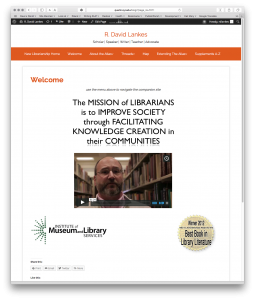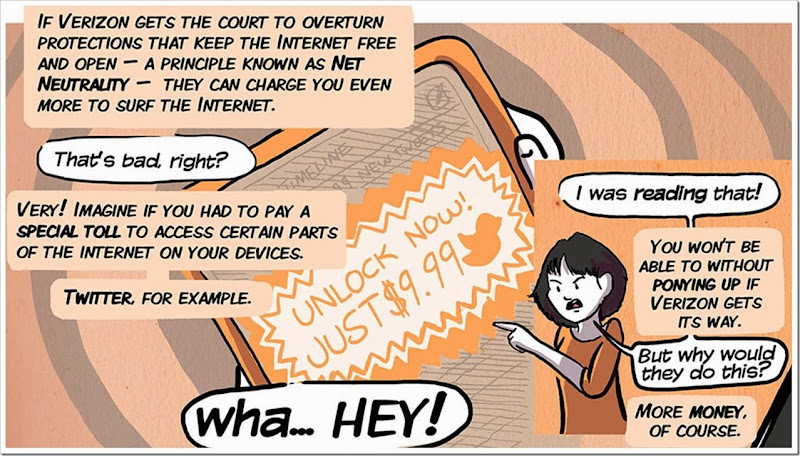Looking forward to Brooklyn.
Urban Librarians Conference
May 6th 2016
S. Stevan Dweck Center for Contemporary Culture, Brooklyn Public Library
Brooklyn, NY
http://www.urbanlibrariansconference.org/
(No Offense to Rocket Scientists)

Scholar | Speaker | Writer | Teacher | Advocate
Looking forward to Brooklyn.
Urban Librarians Conference
May 6th 2016
S. Stevan Dweck Center for Contemporary Culture, Brooklyn Public Library
Brooklyn, NY
http://www.urbanlibrariansconference.org/
(No Offense to Rocket Scientists)
My post on crafting a security narrative in libraries has been translated in Italian.
I have been fortunate in having several of my posts translated in part or whole. Unfortunately most of them revolve around crisis:
Billet Charlie Hebdo publié sur le blog de David Lankes le 8 janvier 2015 et repris par The Library Journal le lendemain | Traduction de N. Clot et R. Bats: http://bu.univ-angers.fr/sites/default/files/traductionopiniond.lankes.pdf
I am also happy to be supporting several translations of my book Expect More:
The Atlas of New Librarianship has been translated into Italian, and a Chinese version is underway.
Lastly I have had several videos captioned in other languages. Here’s one in French:
Come study with me…come help me change the world. Below is the recruitment announcement for Syracuse’s Ph.D. program. I am looking for good folks to come and work with me. It is increasingly vital that we have information scientists and new faculty in the field. Let me know if you are interested. I’d love to talk.
Syracuse University’s School of Information Studies welcomes applicants for our doctoral program. Admitted students are assured of at least four year’s funding (including summers) along with tuition and other support.
The interdisciplinary nature of our program is visible through the backgrounds of the 30 current doctoral students. These students hail from ten countries and have academic training in the social sciences, communications, business, computer science, librarianship, linguistics, information science, and others areas. Our doctoral program is a welcoming and inclusive place for scholars from under-represented populations, something we see as a defining element of our program.
Doctoral students pursue individualized course plans that are tuned to their particular research interests and needs. This means advising and, more importantly, close working relationships with faculty members is a cornerstone of the Syracuse University iSchool Ph.D. program. This is why it is both residential and full-time.
We celebrate the success of our recent graduates who are taking up tenure-track positions in premier research institutions and exceptional liberal arts colleges, excelling in academic and policy think tanks, and pursuing entrepreneurial success! Current students are earning awards for their publications and dissertation work, continuing a long tradition of such recognition.
For 2016, we are particularly interested in speaking with applicants and seeing applications from those whose interests align with one or more of the following research areas
You can learn more about the Syracuse iSchool faculty and interests at https://ischool.syr.edu/research/faculty-research-areas/
You can learn more about the doctoral program and application (due 3 January, 2016) at https://ischool.syr.edu/academics/graduate/doctoral/information-science-and-technology/
Please reach out to the faculty member whose interests draw you forward, the program director, Steve Sawyer, at [email protected] , or our program manager, Jennifer Barclay, at [email protected] with questions!
Here is a “Faculty Minute” I did for the Syracuse iSchool on Expect More and libraries.
UPDATE: The URL has been redirected (though it can take up to a day for the change to take effect).
 The contents of the Atlas of New Librarianship’s companion site are moving from a stand alone server to my site to join all the other New Librarianship activities.
The contents of the Atlas of New Librarianship’s companion site are moving from a stand alone server to my site to join all the other New Librarianship activities.
You can access all that content now here: https://davidlankes.org/?page_id=7071
Next week I will begin redirecting the URL http://www.NewLibrarianship.org to the New Librarianship pages of my blog. So you can use that URL to get information on the Atlas, Expect More, and all related activities.
I’d like to thank the IT folks at ALA for hosting the site to this point. I’d also like to thank Liz Crowder, my great Faculty Assistant for doing the moving.
Please let me know if you see any issues with the new site.
This is the first ever guest post (I’m pretty sure) on my blog. Steve Thomas is a great librarian and has been very generous with posting the Expect More audio book on his podcast Circulating Ideas podcast. He is now looking for support via Kickstarter to transform his fantastic podcast into a book! Please take a read, and please consider giving to his Kickstarter….I did!
Perhaps the greatest task of a librarian is to bring communities together to improve their lives, whether that community is the citizenry, students, faculty, or any number of other specialized groups. This improvement most often manifests as literacy in some form or other, whether teaching search strategies, creating in a makerspace, or expanding access to the written word. Now I would like to bring the librarian community together to help increase the accessibility of my librarian interview podcast, Circulating Ideas.
I’ve launched a Kickstarter campaign to fund transcripts of the show, which would then be made freely available on the web, and as a DRM-free ebook for backers of the campaign (along with a host of other reward options). Why do a Kickstarter? Because transcription is a skilled task, and I want to pay someone a fair wage to do a quality job, and I want to harness the power of the community so that we all feel ownership and pride in the final product.
Since 2011, I have interviewed more than 100 librarians and library supporters, everyone from frontline children’s librarians to ALA Presidential candidates to authors and journalists, but these interviews are locked into audio which can be difficult and time-consuming to search, notate and cite. The podcast medium also excludes those with hearing difficulties and those who simply do not learn well from receiving knowledge aurally.
I believe in the power of communities, and I believe in the power of librarians to make great things happen, so I hope you’ll join me and help me make this project happen to unlock and free the innovative ideas and present them to a wider world.
Let’s go circulate some ideas!
– Steve Thomas
Chapter 2: The Argument for Better Libraries: Expect Impact is now being podcast by Circulating Ideas and NerdAbsurd for free. Can’t wait to see how it ends? You can buy the whole audio book via Amazon, Audible, and iTunes.
I wrote the following post for the iSchool’s Information Space Blog. Thought folks here might find it useful.
Can I tell you why I’m so excited about Amazon’s Kindle Unlimited service? Because, aside from all my publications with academic presses and journals, I am an independent publisher. My book, Expect More, was published as a physical copy and digital copy through Amazon’s tools. What’s better, I’m automatically part of Kindle Unlimited, and maybe this will get me more readers. You see, the vast majority of the 600,000 titles in Kindle Unlimited are self-published books.Want the top sellers in the New York Times list? Ah, go to a library.
Surprised that a professor of library and information science isn’t all that worried about the fate of libraries (mostly public libraries) in the light of Amazon’s Kindle Unlimited launching it’s “Netflix for Books?” Don’t be. Amazon joins a pretty crowded field, including Overdrive,Scribd, and Oyster. What’s more, Amazon is leading with 600,000 items, where libraries have access to tens of millions of titles…seriously.
Perhaps, you may think, I am an ivory tower academic blind to the coming disruptive change…like when the Internet was going to put libraries out of business… then Google…then Netflix…then Yahoo! Answers. Here’s the plain truth: there is a HUGE disruptive change happening in libraries, and it is facilitated by things like Google and Kindle Unlimited. Libraries are shifting from collection-focused buildings to centers of innovation focused on communities. If you think of libraries as places filled with books, you are in for a bit of a shock. Any library that can be replaced by a $10 a month subscription to stuff SHOULD be replaced.

Kids at the Fayetteville Free Library watch a 3D Printer in action. Image via 3ders.org.
Let me give you a small example of what I mean. My wife recently had to be out of town for 2 weeks, so I got single-father duty. The majority of those days we were at the library. We were there so the kids could 3D print iPhone cases for their friends, borrow games, and join Minecraft groups. Did they check out books? Sure, on our way out…if we had time. Why was the public library doing all of these things? To meet the library’s mission of improving their community through knowledge creation. My kids were learning through books, sure, but also video games, Do It Yourself (DIY) printing, and by interacting with other folks in the community. In the coming weeks, the same library is having DIY sessions on home improvement, including electrical work…I NEED that.
Now, this might seem a flippant response to a major technology mover. After all, was there nothing in Amazon’s move that worried me? Oh yes…hell yes if I’m allowed to swear on this blog. It terrifies me and should terrify you how Amazon is currently working to break publishers and pursue a monopoly in book sales. They are making information unavailable to their customers trying to improve their position in the market. They are making titles harder or impossible to find out of a drive to the bottom line, not the good of the people.

An example of the consequences of the end of Net Neutrality. Image via commoncause.org.
But honestly, that is nowhere near as scary as things like network neutrality, where Internet Service Providers are trying to figure out how to monetize your viewing habits and pick the winners and losers in new Internet services. And that, frankly, pales in comparison to digital sharecropping, where huge corporations get massive billion-dollar valuations based on the content and work of their “users.” I mean, who is using whom when YouTube gets bought by Google for over a billion dollars and not one video producer saw a dime?
So are there scary things going on? Yup? Thank God we have some folks who are in the information industry and base their work on century-old values.Thank goodness there are information professionals that continue to maintain an internationally-distributed network of local knowledge hubs dedicated to community engagement and free and fair access to the life blood of democracy: information. Thank goodness there are librarians who long ago realized that it is not the size of your collection, but the reach of your community that really matters.
By the way, if you have $10 a month lying around, try Marvel Unlimited. If you are a comic book fan it is fricken incredible.
I love this idea. I have been a big fan of EveryLibrary since it started. They are doing good work for a good cause (libraries) and they are doing it in a smart way. Their latest effort, Rapid Response Fund, will allow them to help libraries at the 11th hour:
“Our Rapid Response Fund is designed to amplify the voices of local library advocates during a crisis by supporting paid ads for outreach and action. “
I urge you to take a look: http://everylibrary.org/rapid-response-fund/